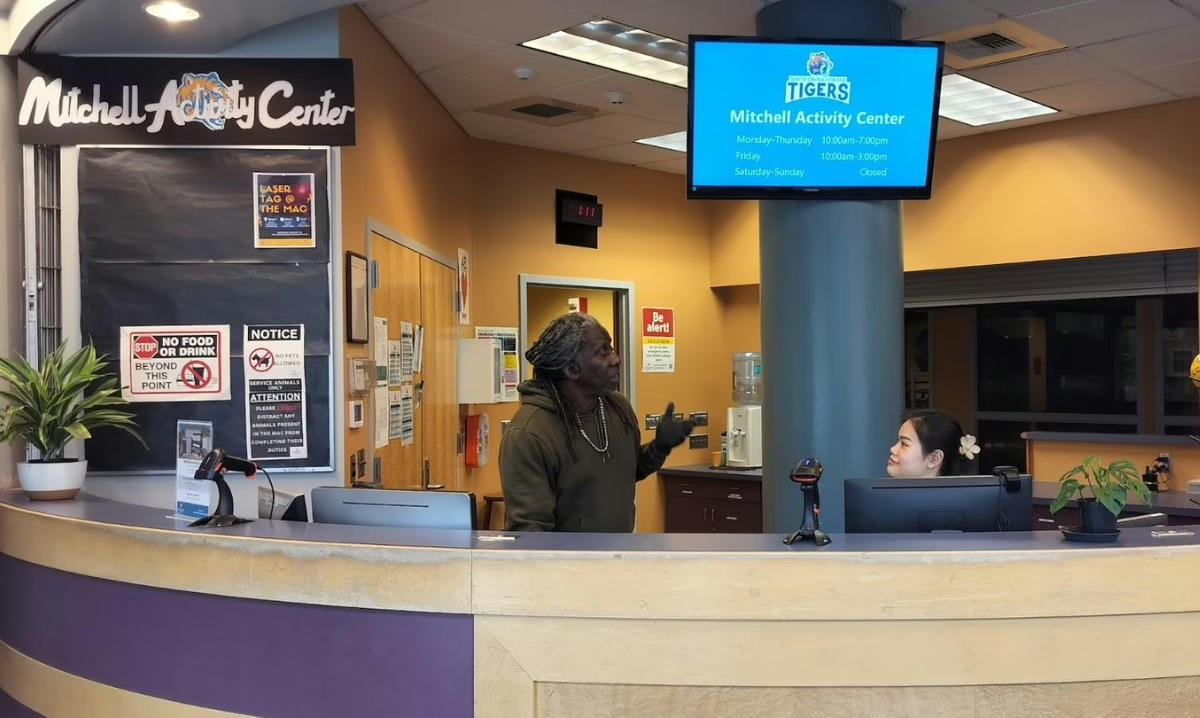A Safe Space of Support: Inside Seattle Central College’s Counseling Center
Imagine Seattle Central College as a living organism, each department an essential organ ensuring the institution’s overall welfare. In our intricate ecosystem of higher education, the Counseling Center regulates the student body’s emotional and mental well-being and ensures the academic community’s success.
Through insightful conversations with Christine Torres-Clara, Brian Smith, Bryce Walb, Nichelle Alderson, and Ruby Hansra, esteemed counselors at Seattle Central, I delved into the inner workings of this dynamic facet of the college.
Short-Term, Solution-Focused Support
While the Counseling Center provides invaluable support to students, it is crucial to delineate what they offer and do not. Familiarity and understanding can help students confidently seek the right resources.
Unlike in-depth therapy, the center specializes in short-term, solution-focused sessions; they work with students to address specific challenges and develop clear strategies for overcoming them while attending Seattle Central. It is important to note that the center does not provide formal diagnoses.
Think of it this way: If a student is experiencing temporary challenges such as test anxiety, adjusting to college life, or career indecision, the center can equip them with tools and strategies to navigate obstacles effectively. However, suppose they struggle with persistent symptoms or suspect a deeper issue. In that case, the center can help by referring students to additional support services focused on diagnosis and ongoing treatment plans.
A Spectrum of Care
The Counseling Center at Seattle Central offers services tailored to students’ diverse needs, including academic, personal, career, and crisis intervention counseling.
Academic counseling assists students in addressing challenges about coursework, adapting to college culture, and comprehending institutional procedures. Walb explains, “Academic counseling is anything that happens in the classroom between students, between you and a professor, things about your learning experience.” It includes challenging the prevalent “grind culture” and advocating for balance. “We talk a lot about: How is school affecting your mind? How is it affecting your heart? How is it affecting your body?” he notes. Referrals to campus support services, such as tutoring or advising, may be provided when necessary.
Personal counseling aids in tackling life obstacles that hinder students’ success. These hurdles encompass issues such as stress, grief, anxiety, depression, self-esteem, relationship issues, or culture shock. Walb underscores the importance of confronting past experiences and evolving coping strategies. He acknowledges that techniques developed in the past may no longer be suitable or even harmful in new situations. “We have a lot of students who have gone through trauma and need new strategies because there are new challenges,” Walb reflects. Referrals to long-term counseling or therapy are given as necessary.
Career counseling aids students in exploring paths that align with their skills, preferences, personality, and interests. Counselors utilize career assessment tools to facilitate students’ comprehension of themselves. Walb articulates the breadth of career counseling, encompassing pivotal decisions such as selecting a major and navigating employment pathways. Walb elucidates that career counseling includes “Balancing the things you need to develop and how to move into being a professional in your field.”
Crisis intervention is there to support students who may face immediate challenges. Counselors are on hand to address these issues and, if needed, guide them toward further support services. “Sometimes students are in a moment where they need help right away. In some cases, quite severe, life-threatening crises,” Smith explains.
Accessibility for All
The Counseling Center at Seattle Central College (located at BE 3166) prioritizes accessibility, ensuring that all enrolled students (of all identities) have free access to in-person and remote appointments covered by tuition and fees.
Their services operate Monday through Friday, aligning with student service hours on campus. They offer appointments from 9 AM to 3 PM Monday through Thursday and from 9 AM to 12 PM on Fridays.
Strategies and Approaches
Counselors understand that seeking help can be daunting. That is why they prioritize creating a safe and supportive space for students.
Smith explains a two-step approach: “First, we want to establish a relationship that we are sympathetic, empathetic, and have experience in helping students, guiding them, and supporting them amid problematic situations.” An initial step focuses on building trust and rapport, ensuring students feel comfortable opening up and sharing their challenges. “We create this environment with the student, that you can rely on us,” Smith affirms. “You can trust us.” Once a trusting relationship is established, the focus shifts towards understanding the student’s needs.
“Secondly, we identify the problem and look toward creating a plan in resolving that problem.” A collaborative exploration of the issue is done, defining it clearly and then brainstorming potential solutions. Smith elaborates, “We move to: what is the problem? What is that? Can we define that? And then, we move rather quickly to some goals about what we can do. What kind of strategies can we take? What kind of support do we have in the environment? And so, we put together objectives about how to move forward and make some solutions or resolutions of the problem.” By working together, students and counselors develop a personalized plan for overcoming challenges and achieving their goals.
Alderson articulates another approach to counseling, focusing on the uniqueness of each individual’s experience. She states, “We each have a thumbprint that is unique and different than anyone else’s.” Alderson sees herself as a guide, supporting individuals in exploring their lives and finding answers from within, “First and foremost, I see a complete individual in front of me. The people I work with are not broken, and I am not going to try to fix them.”
Torres-Clara offers a humanized perspective on mental health, stressing the seamless integration of personal and professional aspects in her approach. She asserts, “I don’t believe there is a separation between personal and professional. We bring how we think personally; we’re all trained to be certain ways because of everything around us in this society. We bring that to work.” She understands the importance of leading by example in promoting mental well-being, “I am not just telling you about breathing techniques or the benefits of physical activity—I am a product of that because I do those things on my own.” Torres-Clara highlights the need to move beyond mere preaching, advocating for actions demonstrating the effectiveness of mental health practices.
Diverse Backgrounds, Unified Mission
The strength of Seattle Central’s Counseling Center lies not just in its counselors but in the diverse experiences they bring to the table, enriching the support they offer students in multiple ways.
“We all have graduate degrees in counseling, psychology, or social work,” clarifies Walb. But they go beyond academic knowledge. “We all have clinical backgrounds,” he explains, “meaning we didn’t just study books.” Each counselor gained experience through supervised internships and work in various settings, building their capacity to support students effectively.
Smith highlights the unique perspective of those with social work backgrounds: “They take a social casework perspective.” Their background translates to an exceptional ability to connect students with relevant resources within the college and beyond. “They’re very much oriented toward connecting with resources,” Smith says.
The clinical and counseling psychology background complements. As Smith describes, “Clinical or counseling psychology looks at the development of the individual, and work with the individual: how they construe their environment, how they can work on their internal thinking and feeling, and managing that, in the service of success, or happiness.”
Human Development Focus
While the word “counselor” might evoke an image of someone dispensing guidance, Seattle Central’s counselors undertake another role: teachers. According to Walb, “What we teach is human development; we talk about growth and well-being.” A human development focus is foundational to their approach, going beyond simply one-on-one interactions to guiding classrooms of students on a journey of self-discovery and emotional health.
Hansra highlights the underutilized yet invaluable resources available to students, particularly the Human Development Courses (HDC). These courses, such as HDC 101, delve into essential aspects of college success, covering topics from study skills to self-care and available resources. HDC 100 focuses on career planning and personal evaluation, aiding students in refining their academic and professional aspirations. As the college continues to prioritize what they call the “first-year experience,” there is potential for expansion in HDC offerings, providing students with more choices and support. One example is HDC 119, which is planned to address stress management, recognizing the significant pressures faced by today’s students, exacerbated by factors such as the pandemic.
Calls for Visibility, Inclusivity, and Support
The counselors at Seattle Central articulate several vital goals to enhance the effectiveness and accessibility of the Counseling Center’s services.
Smith recognizes the significance of the Counseling Center’s physical space, stating, “It needs to be more inviting.” He envisions a transformation where the space becomes vibrant and welcoming, with noticeable signs leading students in. Smith acknowledges ongoing efforts to revitalize the environment, “Our space, we’re working on that; we’re doing a lot of thinking about that.”
Hansra believes it is necessary to diversify the counseling staff to reflect the student body’s varied backgrounds, stating, “We want to continue diversifying ourselves and making sure that students can come and see a counselor that feels more representative of them.” An emphasis on diversity aims to foster a deeper connection and understanding between students and counselors.
Torres-Clara envisions changes to be “systems-wide,” including reaching out to students through class visits and school-wide workshops and collaborating with various departments to integrate mental health awareness into the college’s broader educational initiatives.
Walb advocates for increased staffing during the Summer quarter, suggesting, “We should probably have two counselors budgeted for summer.” Walb also mentions the lack of counseling services available at satellite campuses: the Health Education Center, the Wood Technology Center, and Seattle Maritime Academy. He believes extending counseling services to these locations is essential to ensure more students can access support services.
Furthermore, Walb sees a necessity for a comprehensive needs assessment to understand the specific support requirements of students and staff, engaging with the broader campus community to gather input and identify areas for improvement. Walb advocates for a more proactive approach to addressing mental health needs, stating, “What are the needs? Let’s talk to the people on campus, especially students, even workers.” A collaborative effort aims to ensure that support services are tailored to meet the demands of the entire college community.
Personal Wisdom
In today’s demanding world, prioritizing our mental well-being is crucial. Thankfully, students at Seattle Central are not alone in their journeys. I asked each counselor what they wished to convey to students and our college community:
Walb believes in maintaining a dual perspective: “I think we have to hold onto two things at the same time: That I can love myself and I can want to grow and improve.” He critiques the prevalent deficit perspective pervasive in education and wellness, where individuals often feel inadequate and need more. He advocates for a shift towards self-love and acceptance, asserting, “Holding and honoring and loving ourselves doesn’t mean we can’t see ways we want to improve or grow.” Walb challenges the stigma surrounding mental health, rejecting the notion that seeking help implies a flaw, stating, “Go to counseling because I want to develop, I want to explore, I want to think about my life and who I am.” He emphasizes the importance of prioritizing mental health care, affirming the inherent worthiness of every individual, “You’re worthy. You’re worthy of care.” Walb concludes with a message of inclusivity and compassion: “Don’t think you can’t be loved. Don’t think you’re not worthy. Every human being should be cared for.”
Hansra reminds us of the accessibility and importance of counseling services, stating, “One thing that I want to make sure that our students know is counselors are here; we don’t want anyone to suffer in silence.” She expresses that students do not have to wait for a significant issue to seek help, encouraging them to utilize counseling for maintenance and growth. Hansra believes that “When we’re connecting with ourselves, it makes it easier to connect with others. We gain a little more confidence.” She urges students to spread awareness about the availability of counseling services, highlighting the unique opportunity for free access to professional support. Hansra shows her commitment to each student’s potential and resilience, stating, “Each student that comes in our room, we hold them with great positive regard, without judgment, and we know that you’re resilient, and you’re capable, and full of potential and possibility, whether you see it in that moment or not.” Ultimately, she empowers students to recognize their agency in their healing journey, “Even if you come in and you walk away learning something, or understanding something, or connecting with yourself or others more, or getting connected to services, or whatever it may be, and you walk away feeling 1% better, that is you healing yourself. I know people like to give others credit, but it’s you. It’s you walking through the door, it’s you making the appointment, it’s you coming in, it’s you doing the work. And it’s you using this massive power that each of us has inside to heal, grow, and be stronger. It’s inside you.”
Torres-Clara offers valuable advice to students who may be hesitant about counseling services and the importance of finding the right fit. She acknowledges the diversity of individual needs and preferences, stating, “My thing has always been there is no one-size-fits-all in anything, and counseling is part of that.” Torres-Clara encourages students to explore different counselors until they find someone with whom they resonate. She reassures students that it is okay if the first counselor they meet with does not feel right but urges them to feel confident returning if they need support. Recognizing the interconnectedness of mind, heart, and body, Torres-Clara underscores the significance of addressing mental health concerns: “Our mind, heart, and body are all interconnected. And if one is not working well, none of us will be working well.” She emphasizes the confidentiality and privacy protections within counseling services, assuring students that their information will be kept confidential. Torres-Clara concludes with a message of self-compassion and self-care, encouraging students to prioritize their well-being and seek support when needed, stating, “Please serve yourself, love yourself enough to come and ask for support.”
Smith urges the collective responsibility for mental health support within the academic community: “It’s everybody’s responsibility, teachers, students, student services offices, so-called frontline people, staff, faculty, supporting mental health for ourselves, our colleagues, and our fellow students.” He underscores the importance of not solely relying on counseling services for mental health support but involving all academic community members. Smith advocates for increased awareness and understanding of mental health challenges, acknowledging that greater awareness benefits everyone.
Alderson informs of the universality of mental health, “While we are still breathing, we all have mental health.” Alderson also believes in the fluctuating nature of mental health, expressing, “We may be a little bit further along today than we were yesterday. And tomorrow, we might take ten steps backward.” She urges communities to prioritize discussions about mental health, likening it to addressing physical injuries, saying, “Addressing mental health is something that we, as a community, and especially as an educational, institutional community, have got to get more comfortable with. As comfortable as we are in a cast when we may have broken a bone,” and “We have to prioritize the conversation instead of just prioritizing comfort.” She highlights the impact of individual efforts on others and the importance of modeling healthy behaviors, noting, “Those who are doing their work, personal work, will model for others how to do that work.” Alderson concludes by reaffirming the inherent wholeness of individuals and the value of seeking support when needed, “The fact is that we are all whole human beings. Nobody is broken.”
Beyond a department, Seattle Central’s Counseling Center stands as a vibrant heart, pumping the lifeblood of emotional well-being through the college. The dedicated counselors here offer more than just accessible support; they empower students to navigate the academic landscape with resilience and a sense of self-worth.
Seeking help is not a sign of weakness but a testament to inner strength. As we embrace the wisdom these experts share, let us collectively pave the way for a community where open dialogue about mental health thrives, support is readily available, and each individual feels empowered to journey toward their full potential.

Danika is an aspiring journalist based in Seattle. Born and raised in Jakarta, she has long been drawn to the gravity of stories—the way they hold what might otherwise slip through the day. As editor-in-chief, she approaches her work with curiosity more than certainty, trusting small details to reveal larger truths. For her, storytelling is less about control than attention: a practice of listening closely and noticing what remains after the noise.






